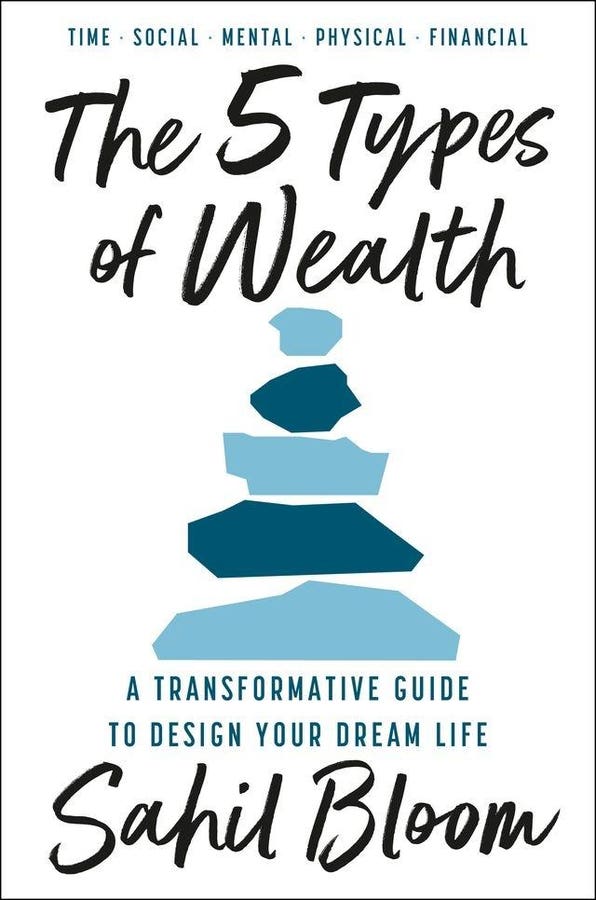I have been following Sahil Bloom through his bi-weekly newsletter, The Curiosity Chronicle. I consider him to be one of the smartest thought leaders in the field of personal growth and development. He offers action oriented practical wisdom. Bloom’s book, The Five Types of Wealth: A Transformative Guide to Design Your Dream Life, has just launched and I had the opportunity to interview him on my podcast “Becoming a Sage.” Though his book offers value for people of any age, our discussion for my podcast naturally focused on advice for people approaching retirement or who are retired.
Bloom’s book involves storytelling, science-backed practices, and actionable insights around the five types of wealth:
1. Time Wealth. How to prioritize energy-creating tasks to unlock more time in your day
2. Social Wealth. How to create deeper bonds and build a powerful network
3. Mental Wealth. How to engage your purpose to spark continuous growth
4. Physical Wealth. How to maximize health and vitality
5. Financial Wealth. How to achieve financial independence and define your version of “enough”
As part of his research for the book, Bloom interviewed a group of people age 80-90 and asked them what advice they would give to their younger selves. In reviewing their answers, his main insight was what they omitted. “A clear theme was how no one mentioned money.”
Interviewees told him “Not to allow money to affect your peace of mind.” In fact, the advice the group shared went in a very different direction, advising us to “tell your partner you love them every day” and “dance at weddings until your feet are sore.”
As you might expect, I was especially intrigued by Bloom’s idea of Time Wealth. My leadership students used to call me Dr. Death because I would talk and teach about death, dying, and grief. Since Bloom is an advocate of the ancient philosophy of “Memento Mori,” Latin for “remember you must die,” I wanted his perspective on why he feels embracing death is critical to being fully alive.
Bloom described his three pillars of Time Wealth as:
1. Freedom to choose how to spend your time
2. Agency over your schedule, and
3. The ability to prioritize what truly matters.
Basically, this concept is not about contemplating death, but about the privilege and value of having control and flexibility over your time to live life on your terms. Bloom calls Time Wealth our most precious asset and having an acute awareness of this is what will change how we live.
We also talked about the loneliness epidemic and why people of all ages should be more concerned about loneliness than all the other issues today. “The single greatest threat to humankind is our reliance on technology. It is draining our ability and energy for human connection. We are not looking up enough!” Bloom refers to this as Social Wealth, and I probed him for specific ideas on how to start building Social Wealth right now.
“Invest in your relationships daily,” he said. “These investments will fill your life now and later.” While our society emphasizes networking to meet others, it tends to be shallow and not often long lasting. It is focused on transactional relationships. Bloom believes in anti-networking, which he described as making the time to develop deeper relationships that often translate into friendships—people on whom you can confide and depend. Connection is protection.
I have three adult sons and bought each of them a copy of Bloom’s book. The earlier we learn the five types of wealth, the better off we will be. In addition to time being our most precious resource, we also need be cognizant of where and to whom we are giving our attention.
It is critical to devote time to invest in friendships and cultivate new relationships. Learning and growth never ends. Living and maintaining a healthy lifestyle throughout our life should start early. Achieving financial independence is based on each of our definitions of success and of having enough.
“Never let the quest for more dominate your life,” said Bloom. It is easy to get caught up in a downward spiral by chasing after more of this and more of that. As the adage says, “Competition is the thief of joy.” Learn when enough is enough.
Read the full article here




